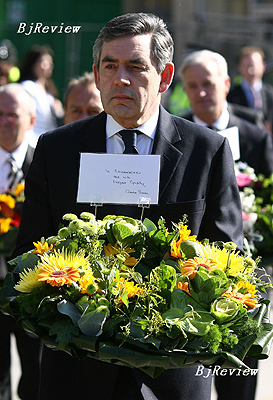
Just days after Gordon Brown became Britain's prime minister, the United Kingdom faced a round of attempted terrorist attacks, pushing the fight against terror to the forefront of the Labor Party leader's national agenda.
Brown had planned to focus on climate change, global competition, extremism, housing, education, child poverty and the country's National Health Service (NHS). But combating terrorism on British soil has taken center stage once again.
After the two attempted attacks in London and Glasgow at the end of June, Brown said he wanted the world to see Britain standing "strong, steadfast and united in the face of terror." To do this, the country would sign new agreements with other nations to ensure a coordinated response to the terror threat. Then on July 8, Brown said that Britain needed more international cooperation in sharing information about possible terrorist acts and suspects, Sky News television reported.
"I want the system that we are trying to expand between Europe, a system whereby we know who are potential terrorist suspects, we expand that to other countries in the world and then we may have a better idea of people coming in to different countries, whether as professional recruits or in other ways, about what the dangers and the risks we face are," Brown told Sky News.
Some Chinese foreign affair experts say that Brown is on the right track in tackling terror at home, but he should make fast headway with more comprehensive measures on several fronts to thwart possible attacks in the future. Brown not only must increase Britain's domestic security measures, but also must consider changes in the country's immigration policy, they said. He must quickly set up agreements with other countries to exchange information on would-be and actual terrorists associated with Al Qaeda and promote understanding among Islamic and non-Islamic people in Britain, they said.
Li Wei, Director of Center for Counterterrorism Studies at the China Institutes of Contemporary International Relations, said that terrorists can easily penetrate domestic security systems in European countries, including Britain, more so than in the United States. The Americans increased their security measures drastically after the September 11 terrorist attacks six years ago, making it harder for extremists to carry out their plans, he added.
Britain also has a flawed immigration policy and in some instances has proved to be an imperfect environment for different ethnic groups, Li said. With its long history of attracting immigrants from its old colonies in South Asia where Al Qaeda is active, the country enables extremists to easily pass through its borders, he said. That several suspects detained in the car-bomb plot were linked to Britain's NHS proves the country's immigration policy has problems, he added.
Brown ordered a review of the NHS recruitment process because all eight suspects in custody are believed either to currently work in the NHS or have been employed by it in the recent past.
Each time a terrorist attack occurs, it widens the gap of misunderstanding between Islamic and non-Islamic people, Li said. "If the British Government does not change its ethnic or religious policy, the situation might get worse," he said.
While Western countries like the United States and Britain are paying more attention to dangers outside their countries and employing hi-tech means for preventing possible future attacks, extremist threats now are growing inside the countries, Li said. With bombing devices becoming more ubiquitous and easier to use, attackers can use common chemicals to construct explosive devices, he added.
| 